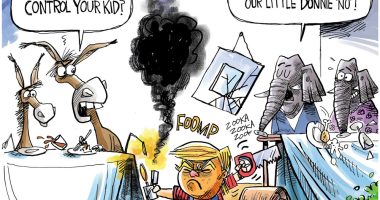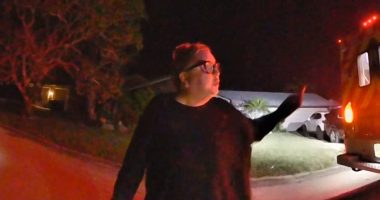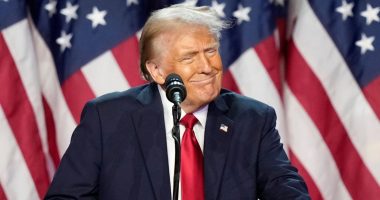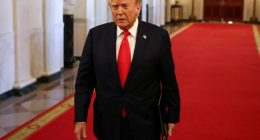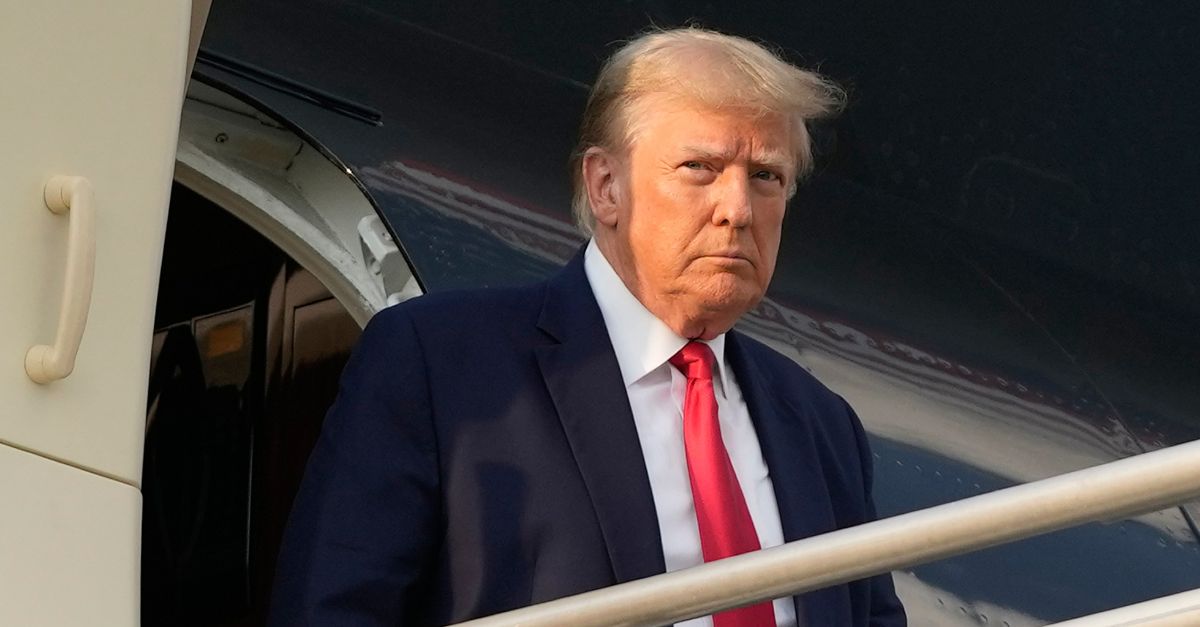
FILE – Former President Donald Trump steps off his plane as he arrives at Hartsfield-Jackson Atlanta International Airport, Thursday, Aug. 24, 2023, in Atlanta. (AP Photo/Alex Brandon, File)
On Monday, a federal judge will set a much-anticipated and hotly-contested trial date for Donald Trump to finally face a jury of his peers in Washington, D.C., for charges that he corruptly conspired to subvert the results of the 2020 election in the lead up to and on Jan. 6, 2021.
Trump, despite facing criminal indictments — and a civil case — in multiple venues beyond Washington that include New York, Georgia and Florida, is still running a presidential campaign with eyes set on the White House for 2024. In sum, Trump faces a whopping 91 criminal counts over all.
As such, the twice-impeached, quadruply-indicted, single term former president has already asked the judge presiding over his case in Washington, U.S. District Judge Tanya Chutkan, to set an April 2026 trial date there. Trump, through his attorneys John Lauro and Todd Blanche, has argued it would take him more than a year to prepare for this particular indictment given his competing demands.
And he noted, setting a trial date prior to 2026 would simply be impossible due to the voluminous records prosecutors have said are part of discovery — namely, some 11.5 million pages in evidence already remitted to Trump’s lawyers.
Prosecutors, however, have strongly balked at the request, noting, among other things, that the proposed delay would deny the American public its right to a speedy trial. Instead, special counsel Jack Smith has asked Chutkan to set the trial for Jan. 2, 2024, mere days before what will be the third anniversary of the Jan. 6 attack on the U.S. Capitol. The attack left more than 140 police officers injured, forced some into early retirement and resulted in the deaths of at least five people, including Trump supporter Ashli Babbitt. Babbitt was shot by an officer after ignoring several requests to stand down as she tried to force her way with other rioters onto the floor of the House of Representatives.
Trump’s lawyers argue, in effect, that the evidence they have been provided is excessive. Drawing highly dramatic comparisons, the former president argued through his lawyers that if he were to go to trial as the special counsel requested, it would mean his attorneys would have to read the equivalent to Leo Tolstoy’s “War and Peace” from cover to cover, 78 times a day. Lacking from Trump’s motion was the truth about how most lawyers actually prepare for trial: through the extensive use of paralegals and other aides and a regular use of macro and micro search functions that then scan through hundreds of documents with comparative ease.
Smith brushed away Trump’s dramatics and urged Chutkan to do the same.
Some of what prosecutors have turned over is mostly public already, federal prosecutor Molly Gaston argued. Like, for instance, the relevant transcripts from the House Select Committee to Investigate the Jan. 6 Attack on the U.S. Capitol. They are part of the public domain already and so too are Trump’s relevant social media screeds. Much of this wouldn’t be new information to the defense.
The special counsel’s office also assured the court that much of what has been turned over to Trump’s defense team already was provided out of an abundance of caution and desire for greater transparency. There would likely be many duplicate records in the mix, prosecutors said. For example, Gaston explained that the U.S. Secret Service turned over some 3.1 million pages of material “including all emails in a given time period for a number of custodians, generating a large number of irrelevant and duplicative records.”
“The government provided these materials in load-ready files for importation to a searchable electronic database with the understanding that the defense, consistent with modern standard practice, will review discovery electronically rather than manually,” Gaston wrote.
And the defense isn’t going to have to needlessly hunt and peck for pertinent details. Those have been fished out by prosecutors already to help streamline the process. If the defense requires the U.S. government to specifically identify exhibits it intends to use at trial, special counsel has said it can do that, too.
There is not a huge amount of classified material expected to be used at this trial, but sensitivities must be considered.
Read Related Also: Teenage cyclist is killed in hit-and-run: Police arrest man in his 50s over death of boy after crash between truck and pedal bike
Judge Chutkan issued an order on Aug. 22 deeming certain protective measures remain in place regarding any classified or potentially classified materials that might surface as the case hurdles toward trial. Importantly, these rules won’t just apply to Trump. His lawyers will also be subject to terms now governing sensitive records, documents or other related correspondence in evidence.
Any classified information the government provides to Trump or his team, the order expressly states, is to be used “solely” for the preparation of his defense and defense attorneys will only have permission to review classified records if they have received the necessary clearance for a given document, received permission from the Justice Department or if permission is granted through a separate court order as necessary.
“The defense may not disclose or cause to be disclosed in connection with this case any information known or reasonably known to be classified except as otherwise provided in this order,” Chutkan wrote.
Though these and other terms in Chutkan’s order are boilerplate for a criminal defendant where classified records are involved, Trump is far from the typical criminal defendant. For one, the former president is already charged with a crime involving his alleged illegal retention of classified documents in Florida. And next, he has already expressed, much to Chutkan’s and the federal government’s concern, a penchant for discussing this election interference case—and another he faces in Georgia—publicly.
At Trump’s last motion hearing in Washington on Aug. 11, his attorneys Lauro and Blanche met with prosecutors to hash out terms of a proposed protective order for evidence. For the most part, Chutkan agreed with Lauro and Blanche that Trump should be allowed to discuss his case publicly, as is his First Amendment right, but with caveats.
She emphasized, for one, that Trump would not be given carte blanche to sully the “normal order” of proceedings by making haphazard statements about the case publicly or by disclosing evidence that could potentially harm the integrity of the process, intimidate witnesses or jeopardize a prospective jury.
Whether running for president in 2024 is his “day job” or not, she said, this was a serious criminal trial and a serious criminal matter and regular order would prevail.
The hearing on Monday before Judge Chutkan gets underway at 10 a.m. EST.
The former president was indicted in Washington on four felony counts related to Jan. 6 including three charges of conspiracy: to defraud the U.S., to obstruct an official proceeding, and to “injure, oppress, threaten, or intimidate any person in any state, territory, commonwealth, possession, or district in the free exercise or enjoyment of any right or privilege secured to him by the Constitution or laws of the United States.” He faces a fourth count for obstruction of and attempt to obstruct an official proceeding.
He has pleaded not guilty.
This story is developing.
Have a tip we should know? [email protected]


